On The Town … With Chip Deffaa REFLECTIONS ON THE 2015 TONY AWARDS….
Now that the dust has settled, may I offer a few thoughts on the Tony Awards presentation?
Theater has always been my first love. Oh, I’m crazy about dance, too; and jazz, and blues, and classic pop music. But theater has always been my first love. I’ve watched every Tony Awards presentation since the first national broadcast of the awards ceremony in 1967; originally, I watched each year on TV, recording each broadcast for posterity. For more than a dozen years now, I’ve attended the Tony Awards in person. It’s my favorite annual event. I enjoy celebrating theater, with terrific company, as part of the theatrical community.
I just wished the people who produce the Tony Awards these days seemed to love and respect theater as much as I do.
I always enjoy the Tony Awards. But there were moments at this year’s presentation that made me cringe. Moments when I felt like I was watching just another crass, commercial TV show, not a thoughtful, high-class event to honor the best contributors to the theater world.
Every member of the theater community should have been embarrassed by the fact that the Tony broadcast gave more time on camera–and a bigger buildup, generally–to a pop singer, Josh Groban, who has never performed on Broadway–than it did to Tommy Tune, who has devoted his life to the theater.
For his work over the years as a performer, director, and choreographer, Tommy Tune has now won ten Tony Awards–more than any other person. This year he was presented with a Tony in honor of his lifetime achievements. That should have been a high point of the awards ceremony, honoring this man who has done as much for Broadway as any man living.
But his award was not presented “live” on TV. It was presented earlier, in the first part of the Tony Awards presentation, which CBS TV chose not to cover “live.” An edited snippet of the presentation of the award to him and his acceptance speech was televised. The TV audience never even got to see the standing ovation we gave him in the theater.
To the producers of the Tony Awards, it was more important to give prime air time to Josh Groban, a pop star, than to a man who’s devoted his life to Broadway. The subliminal message being sent to every viewer of the awards ceremony was that success in the pop arena is more important than success in the theater. Should the Tony Awards–which were created specifically to honor people who contribute to the theater–be sending out that message?
Groban was chosen to sing “You’ll Never Walk Alone” as part of the “in-memoriam” tribute to members of the theater community who died in the past year. And he sang well. But the staging focused far more attention on Groban–who’s never set foot on a Broadway stage–than on any of the theater artists being saluted in the memorial. That, too, is wrong. (And I hated hearing Kristen Chenoweth gushing repeatedly that Josh Groban would be on the show–as if he’s a greater artist than her, which I don’t believe for a minute. In her field, musical theater, she’s a first-rate artist. As is Alan Cumming, who co-hosted the Tony Awards with her.)
I have nothing against Josh Groban; he’s sold millions of recordings, and he’s made plenty of appearances on TV, and he certainly has a following. But this was supposed to be a night celebrating Broadway. I can think of any number of Broadway divas–past Tony Award winners–who could have sung “You’ll Never Walk Alone” at least as well as Groban did, and would have more properly belonged there: Barbara Cook, Betty Buckley, Audra MacDonald, Patti LuPone, Bernadette Peters…. They would have represented Broadway. This was the theater’s night. The goal was to promote Broadway. Would it have been too much to have had a giant of the theater–not a pop recording artist–deliver the final send-off to the departed greats of the theater?
Oh! I was excited when I arrived at Radio City Music Hall to attend the Tony Awards. I was with great company; this was the theater’s night; and I couldn’t wait for the Tony Awards ceremony to begin. I was heading towards my seat in the orchestra when I heard an announcement urging us to get seated because “the pre-telecast” was about to begin. And moments later that awkward, insulting phrase was uttered again; we were being welcomed to the “pre-telecast.” “No!” I wanted to shout out; we should be welcomed simply to the Tony Awards, not “the pre-telecast”; the Tony Awards were beginning. But to some TV producer calling the shots, this first part of the awards ceremony–in which not only Tommy Tune’s lifetime achievement award would be presented, but also the awards for Broadway’s best librettist, best creators of music and lyrics, best director, and best choreographer–was merely “the pre-telecast.” As if it were some kind of pre-show warmup, of secondary importance, before the real event began.
Please don’t ever welcome us again to the “pre-telecast.” Welcome us simply to the Tony Awards. (Even if you choose not to televise all parts of the awards ceremony “live.”) The awards for the people who create the shows are at least as important as the awards for the actors hired to appear in those shows. When I was young, watching early Tony Awards presentations on TV, awards for best writers were always televised “live,” along with all of the other awards and musical numbers. Seeing the respect shown to playwrights and songwriters gave me–a youth who loved to write (as well as perform)–a feeling those were fields worth aspiring to.
What is the message we are giving young viewers today when we relegate awards for the people who write shows to the “pre-telecast”? We are telling viewers that anyone nominated for “best featured actor” is more important than the people who write the scripts, or the lyrics, or the music. But what would Broadway be without the writers who create the shows? We keep reviving shows like “The King and I,” “Gypsy,” “Fiddler on the Roof,” “West Side Story,” “Carousel,” “The Music Man,” “Hello, Dolly!,.” “South Pacific,” “Oklahoma” because the material is so strong.
The original stars may pass away. But if the writing is sound, the shows will continue to live. When “The KIng and I” originally opened on Broadway, the only cast member given star billing (above the title of the show) was Gertrude Lawrence; she was a giant of the theater in her day. When “Gypsy” first opened on Broadway, it was perceived as Ethel Merman’s personal triumph. And stars like Lawrence and Merman sure sold tickets in their day. But the shows themselves were so well-written that they can be revived again and again with new stars interpreting the material successfully; and young audience members who never saw a Lawrence or a Merman delight in the shows. Because of what the writers created.
Please, producers of the Tony’s, don’t disrespect the creators of the Broadway shows; the writers should be honored “live” on national TV.
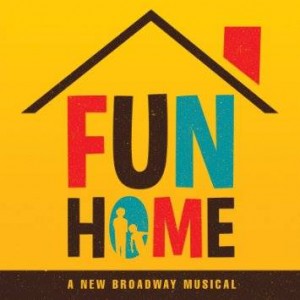 I was glad I was in Radio City Music Hall to witness, “live,” as it happened, the presentations of the Tony Awards for best book of a musical and for best score of a musical to the women who created “Fun Home” (Lisa Kron and Jeanine Tesori). I thus got to feel the momentum building, early in the night, for “Fun Home”–which went on to win the Tony for “best musical.” This was, incidentally, the first time in the nearly 70-year history of the Tony Awards, that women won the awards for writing the outstanding book, music, and lyrics of a musical. That should have been witnessed “live” by the whole television audience; Kron and Tesori are role-models for young women aspiring to write for the theater. Everyone should have seen, in real time, that history being made.
I was glad I was in Radio City Music Hall to witness, “live,” as it happened, the presentations of the Tony Awards for best book of a musical and for best score of a musical to the women who created “Fun Home” (Lisa Kron and Jeanine Tesori). I thus got to feel the momentum building, early in the night, for “Fun Home”–which went on to win the Tony for “best musical.” This was, incidentally, the first time in the nearly 70-year history of the Tony Awards, that women won the awards for writing the outstanding book, music, and lyrics of a musical. That should have been witnessed “live” by the whole television audience; Kron and Tesori are role-models for young women aspiring to write for the theater. Everyone should have seen, in real time, that history being made.
And this trail-blazing show, “Fun Home,” deals, in part, with a young girl becoming aware of her feelings for members of her own sex. The theater has always pushed the envelope a bit further than–and a bit earlier than– film or TV. Had the Tony Awards presentation let us see these ground-breaking writers honored properly, in real time, we would have seen more clearly one of the strengths of the theater–its ability to deal with challenging themes before movies and TV have come to consider such themes mainstream. But that message got muted, because the producers of the telecast apparently weren’t all that interested in who’s writing for the theater, or what they are writing.
When I was younger, Tony Awards presentations on TV (produced by master Broadway producer Alexander Cohen) had the feel of Broadway from start to finish. The broadcasts in more recent years have been less consistent–sometimes having the feel of TV more than of Broadway.
I hated it when cohosts Kristen Chenoweth and Alan Cumming “bantered” (in an obviously scripted, lame sequence) about how movie stars always got to replace Broadway stars when Broadway shows were adapted for the screen–ending with them saying, in mock desperation, that they were available for films and would work cheaply. That sequence was embarrassing. Cumming and Chenoweth are musical-theater stars of great magnitude. What writer would give them a script–and what producer would approve it–that made them seem, even briefly, to be desperate for film work, willing to work for low pay if only someone would hire them? I wished the writers and producers of the Tony Awards presentation would treat the theater and its stars with more respect. Cutting that low-class sequence would have freed up some time that could have been used towards presenting more awards “live.”
For many years, the shows that were nominated for Tony Awards were the only shows that got to present musical numbers as part of the Tony Awards presentation. Nowadays, whether a show is nominated for a Tony Award or not does not seem to matter too much. For example, “Finding Neverland”–which was not nominated for a “best musical” Tony–got great exposure on both last year’s Tony Awards presentation and this year’s. This year it seemed as if any musical that was running on Broadway in June 2015 got to be on the Tony Awards (so long as they were willing to bear the expenses involved). So the telecast becomes a succession of musical numbers. I enjoy seeing musical numbers. But more is not always better. I think that if you present too many numbers, they all begin to run together, and each number has less impact.
As the broadcast neared its conclusion, we were invited to watch “the Jersey Boys”–and then “the Jersey Boys” came out and sang the Four Seasons’ pop hit from 1975, “December 1963 (Oh, What a Night”), and everyone joined in. That closed the show.
But note: they were introduced simply as “the Jersey Boys.” We were never told the names of the actors playing those four “Jersey Boys”–the current stars of the Broadway musical “Jersey Boys.” And that’s how the Tony Awards presentation ended–not with a song written specifically for Broadway, sung by any identified Broadway stars, but with a 1975 pop song sung by four unnamed performers–as if the names of actors don’t matter. As if a 40-year-old pop song, sung by actors whose identities do not matter, symbolizes Broadway of today. And gets the closing spot.
And if that is the message the Tony Awards presentation is trying to put out there, I worry a bit about the future of Broadway.
Don’t get me wrong; I enjoyed being at the Tony Awards. I always like being there. While I’m there, I feel like I’m part of a big party celebrating the theater. And I always enjoy parties. At one point, I took out of the pocket of my tuxedo a note for an inspiring friend, Ramsey Dallalsheh, and wondered if he might be watching the awards ceremony. The next day he told me he had been watching. And so did a friend from halfway around the world. And I was glad to be part of something that big.
There were some terrific musical numbers in the Tony Awards show, from “Fun Home” (young Sydney Lucas was amazing–what a future she has!), “Something Rotten,” “The King and I,” “An American in Paris.” Even the performances that didn’t quite work (that uncomfortably manic, forced rendition of “The Night they Invented Champagne” from “Gigi”) helped publicize Broadway shows. (“Something Rotten” has cleverly managed to get mileage out of the fact that it did not win a Tony for best musical–launching an ad campaign noting that plenty of other popular shows, from “West Side Story” to “The Drowsy Chaperone,” failed to win to win Tony’s.)
It was an entertaining night. I loved being in a theater filled with many leading figures of the theater world. And I’m glad the Tony Awards have given some shows boosts at the box office.
But if the night is truly supposed to honor the BEST of Broadway, it could have been better. I wish the producers would really commit, fully commit, to celebrating theater.
Tommy Tune, just walking down the aisle to his seat in the orchestra, had more style and grace and class than much of the broadcast. I couldn’t help wondering how much more “Broadway” the night would have felt if Tommy Tune had been put in charge of the whole event.

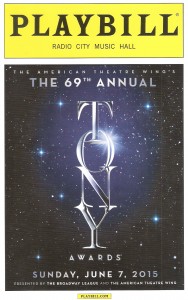
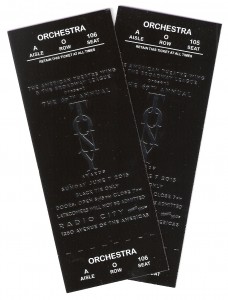
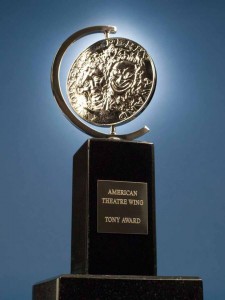


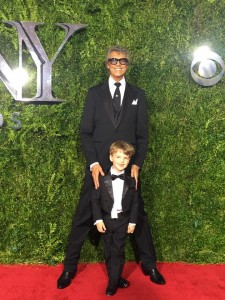
The telecast is the product of complicated politics and priorities.